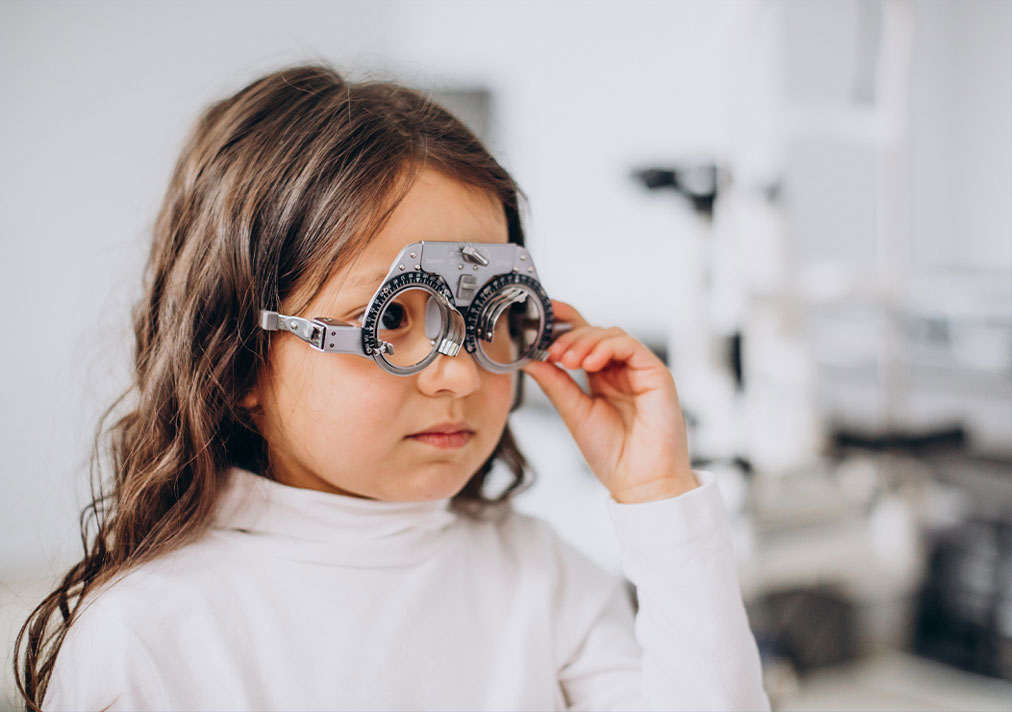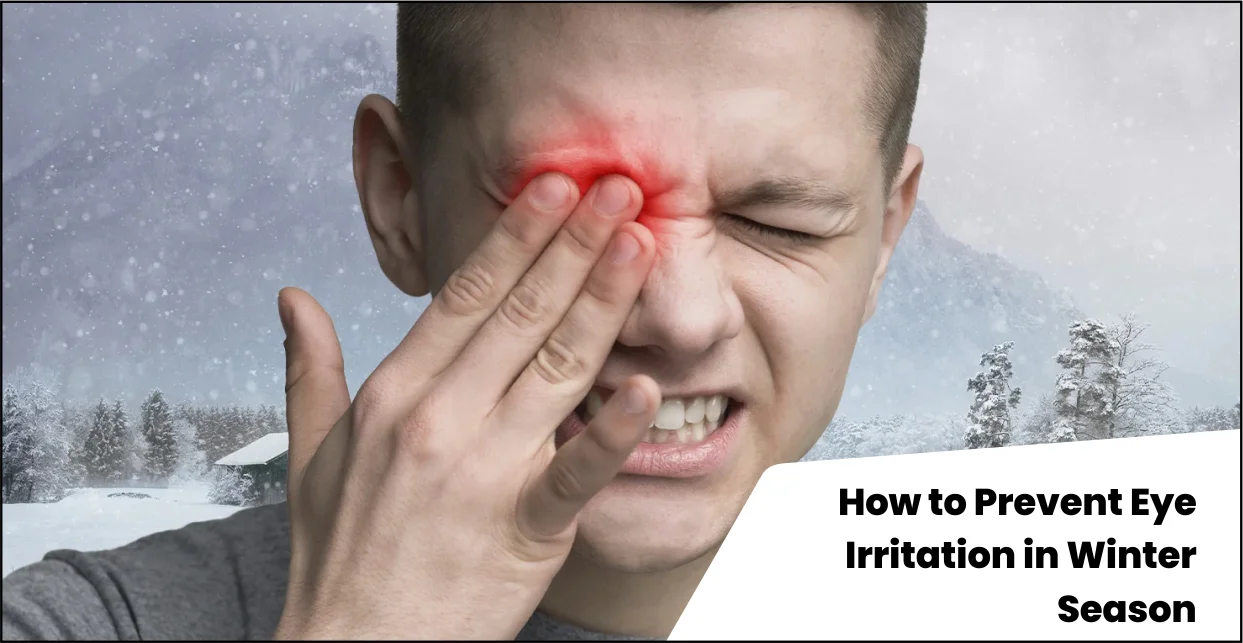Winter calls for body moisturizing and adopting different means to keep the body warm. We tend to forget about our eyes. This is a sensitive part of the body and needs equal attention like any other part does.
We can’t agree more that winter brings about a pleasant change in our mood and we enjoy chillness. However, it is not too kind on the eyes because it makes people uncomfortable in ways that it causes infections, watery flow, redness, and dryness.
At Eye-Q Eye Hospitals, we are well-aware of how changes in season can have a direct impact on the eyes. Read on to know more about how to prevent eye irritation in winter.
Eye Irritation Worsens in Winter – Why Does This Happen?
Drastic environmental changes are witnessed in the cold season regardless of being outdoors or indoors. Red, burning, and irritated eyes are not just disturbing at the moment. At times, these symptoms could have a repercussion on your overall eye health.
Reasons why the eyes are not as comfortable during winter:
- Eyes feel gritty due to the dryness in the cold air outdoors and warmth indoors
- Tears evaporate due to excessive chillness causing irritation in the eyes
- Digital eye strain in winter increases as the days are shorter and watching screens indoors becomes more common
- Sensitivity during winter increases and dust or allergens can affect the eyes due to indoor heaters
- Due to strong sunrays in winter, the eyes experience dryness
While these are some of the reasons for eye irritation during winter, they are preventable.
How To Prevent Eye Irritation In Winter Season?
- Boost Moisture In Your Eyes
The cornea gets its nutrients and oxygen from moisture. The eyes need to be sufficiently moist to remain protected from infections.
The tear film in the eyes is oily and watery. This water is required to cleanse debris and provide a clear vision as well. During winter the tendency to experience dryness is more so apply necessary drops, drink lots of water, and humidify your room to retain sufficient moisture.
At Eye-Q Eye Hospitals, there is a personalized treatment plan designed to provide the best eye drops to tear duct therapies to relieve the patients eyes from pain or irritation.
- Commit To Healthy Screen Habits
Since winter brings along dryness. Due to work and with a cozy indoor setting, you might tend to watch the screen a lot more than usual.
To prevent complications with your eyes, stick to healthy screetime. You can make sure the screen lighting is suitable, watch your screen at an arm’s distance, and give your eyes a few seconds of break every 15 minutes of watching the screen.
At Eye-Q Eye Hospitals many students and professionals with screen-related issues come by and we undertake digital eye strain assessments to create the right treatment plan for them.
- Choose An Eye-Wear For UV Protection & Boost Moisture
The tear film in the eyes is at a bigger risk during winter, to prevent this and avoid instances of irritation or dryness, you can wear UV protected sunglasses when stepping out, avoid rubbing your eyes too much as it can cause a bad infection, try turning to UV protected contact lenses, avoid staring at the sun directly for too long, do a warm compress or choose an eye mask that is quite moisturizing.
- Change Lifestyle Habits For Prevention Against Infections
During winter, flu viruses are in the air and there is a possibility of getting pink eye due to the infections around. What you can do to prevent eye irritation during winter is keep your hands clean, avoid using personal items with others, avoid using infected contact lenses, and use different eye makeup after every 3 to 6 months. In this hospital, you can consult with our optometry experts and choose protective lenses suitable for your eye needs.
- Maintenance of Eye Hygiene
Especially during winter it is quite essential to maintain good eye health. Prevent eye irritation by following a few healthy habits such as eye make up removal before going to bed, thorough cleansing of spectacles and contact lenses, refrain from touching the eyes,
- Healthy Diet To Prevent Eye Irritation
It is necessary to include healthy foods in your routine to sustain good eye health and prevent it from experiencing irritation. Best recommended nutrients and foods that should be a part of your meals are
- Salmon, flaxseeds, broccoli, kale, bellpepper, sunflower seeds, walnuts, almonds, sweet potato, carrots, avocado and walnuts for good tear health
- Vitamins to retain healthy corneal tissues. Foods to include are spinach, oranges, and carrots — essential for healthy corneal tissues.
- Boost night vision and improve retina health with zinc and lutein rich foods
When should you see a doctor?
It is common to experience irritation or dryness. However, what should not commonly be ignored are the following symptoms:
- Burning sensation for long
- Redness
- Watering from the eyes
- Discharge
- Extra sensitivity to light
- Blurry vision
What do the Eye-Q Eye Hospitals team of specialist ophthalmologists provide?
- Conduct eye exams
- Provide treatment options for allergies and dry eyes
- Provide preventive and eye care tips
- Tailored solutions for UV protection and screen fatigue
- Technologically-equipped diagnostic tools
What Makes Eye-Q Eye Hospitals Stand Apart For Preventive Winter Eye Care?
- We provide quality care throughout all our locations
- We have expertise in allergy, corneal, and dry eye management
- Equipped to diagnose digital strain and conduct tear film test
- Provide seasonal preventive eye care programs
Conclusion
Before it is winter time, take extra preventive eye care such as staying hydrated, wearing eye-wear to protect your eyes from cold wind, sufficiently lubricating your eyes, and staying committed to limited screen-time to avoid irritation.
In case your symptoms remain, better avoid treating it on your own. It is sensible to get it diagnosed under the supervision of an experienced specialist and get treated. You can always reach out to Eye-Q Eye Hospitals – the right destination to take care of your vision with expert ophthalmologists.




